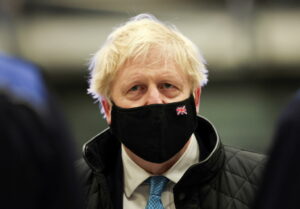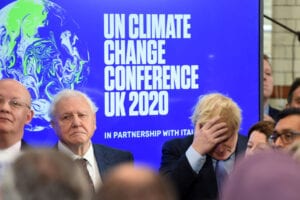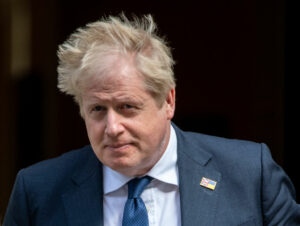In the end, after a good night’s sleep and some reflection, Boris Johnson did not cling raging onto power like Donald Trump, as his critics in Parliament and the media had predicted. Instead he resigned his leadership of the Tory party, made a wry and thoughtful speech (“them’s the breaks” gave translators a hard time), appointed some ministers to fill the jobs in his caretaker government made vacant by earlier resignations, and waited for the Tory Party to elect a new leader so that he could resign as Prime Minister too.
His exit was far more dignified than were the embittered demands of his parliamentary enemies (on both sides of the House of Commons) that he be driven into the streets, made to apologize for his sins, and in general treated as a criminal released on bail but bound to end up inside before too long.
Make no mistake about what’s going on. This is scapegoat politics.

BoJo: no longer PM, but still an honorary Cossack.
Boris is having to shoulder the blame for the pandemic, the lockdown, the cancelation of most other medical treatments in order to treat Covid patients promptly, the closing of schools and universities, and the accumulating costs in billions of the shutdown of the economy to save lives. All of these now look like serious errors since the Swedish “experiment” of protecting the elderly from Covid rather than maintaining everyone at home at the taxpayers’ expense saved billions of public money and kept the Swedish economy humming along. Was Britain's lockdown—and all its attendant costs—really necessary? That looks increasingly unlikely.
And if not, was Boris responsible for these disastrous decisions? Well, he was prime minister and therefore in principle responsible for all the decisions of his government. But the political reality is that in the early stages of the pandemic, the politicians had no realistic alternative to adopting the remedies prescribed by the scientists in Whitehall and Imperial College and by the U.K. medical officers of health.
If they had rejected their advice and instead followed the Swedish example, the opposition parties, a hostile media, and influential tabloid personalities would have accused them of risking wholesale slaughter—and a frightened risk-averse public opinion would have believed them.
As it was, all these forces wanted the pandemic restrictions to be tougher and longer. For a long time Boris and his ministers were more or less ventriloquist’s dummies speaking lines written by scientific and medical officialdom in London. Boris struggled to break free and eventually ended the lockdown. But he took a lot of heat for doing so sooner than the Whitehall committee of SAGE, plus “Independent Sage,” the media, Labour, and Uncle Tom Cobley and all wanted.

Did Covid help do him in?
Britain today and tomorrow will be paying a heavy price for their miscalculations, risk-averse science, and economic ignorance. Boris is paying it today.
In other respects he had real achievements to his credit. He got Brexit done. He sent the extreme left Labour leader, Jeremy Corbyn, packing in the 2019 election. He put together a broad-based national coalition of all social classes to win his 2019 landslide victory. He was personally popular--a well-known public figure who had edited the Spectator magazine, written a column in the Daily Telegraph, and appeared for years on a popular radio comedy program about current affairs: "Have I Got News for You." And he still has lots of supporters throughout the country who are indignant at his defenestration.
Why then is he Out with a capital O? The answer is his policies. More and more voters, especially those who voted Tory in 2019 for the first time ever, thought he had let them down over policy. And, sadly, they're correct. His policies were almost more socialist than Labour, hiking spending and raising taxes. He was a passionate advocate of a “Net-Zero” carbon emissions that threatened to reduce living standards, increase taxes and electricity prices, and make the energy crisis a permanent one.
Why did he embrace these policies? I believe it was for the same reason that he initially bowed down to the consensus of doctors and scientists: he believed he had no alternative. It’s vital to say that clearly now because almost exactly the same thing is likely to happen on a very different playing field, the Tory leadership election, unless we wake up.
The candidates seeking to succeed Boris—and there are now about twelve of them—almost certainly believe that Net-Zero and other Green policies governments are pursuing throughout the West are set in stone because the Blob of international bureaucrats are telling them so. They have signed treaties saying so that they must enforce--the Paris accords in the case of Net-Zero. There's no alternative.

Going "Green" kills.
But the practical results of these policies are becoming clear and disturbing: their costs are rising; governments are forced into more and more absurd postures to meet their obligations—e.g., Germany is now reliant on "dirty" coal because it's closing down its remaining nuclear power stations; and the threats of energy blackouts and forced lifestyle changes are becoming more real to the voters. Net-Zero is a particularly visible and painful case of this government spending by international treaty obligation--but not the only one.
The same is true of many other policies that the bureaucratic groupthink of international bodies sanctifies as politically essential or a done deal—for instance, the Biden administration's push for all countries to agree on a high (15 percent) uniform rate of business tax that benefits high-spending governments such as France and Germany and disadvantages smaller economies like those of Ireland and Hungary. Britain's chancellor under Boris, Rishi Sunak, didn't like this tax which is higher than the Brits want, but he went along with Biden for the sake of a quiet life and agreed the Brits would raise it too.
Well, in the race to succeed Boris, all these issues are up for grabs. Democracy is no respecter of international bureaucratic stare decisis. Rishi Sunak may be stuck with his 15 percent business tax that disadvantages U.K. companies, but none of the other candidates are. Ditto Net-Zero. And if one candidate comes out against these policies and the higher taxes they require, he creates an incentive for all the others to do so—and with luck starts a policy auction.
Indeed, if one candidate were to put together a policy package that included Thatcherite cuts in both taxes and public spending, a shift of resources into defense, a more rational energy policy that stressed security, reliability, and price rather than “renewables,” a post-Brexit policy that makes Britain more competitive by diverging away from the E.U.’s burdensome regulations, and a defense of Britain’s traditions and achievements against the Wokerati in the establishment and civil service, he might break through the log jam of progressive policy-making by international bureaucracies and restore democratic control of taxation and public spending.

Blown away, but the fight goes on.
As it happens, Lord David Frost, who resigned from Boris's government at the end of 2021 because he objected to its “direction of travel,” made the case for just such a policy package in last Wednesday’s Daily Telegraph. He’s not in the Commons, but he's prominent in Tory debates, and he might well return to the Cabinet under a new leader. He's already leading the way in policy formulation and he won't object to candidates in the race accepting that baton from him.
Already, one of the candidates, former Attorney General Suella Braverman, has done so. Others are likely to follow:
In order to deal with the energy crisis we need to suspend the all-consuming desire to achieve net-zero by 2050. If we keep it up, especially before businesses and families can adjust, our economy will end up with net-zero growth.
It won’t happen overnight. It took Margaret Thatcher seven years from her election as Tory leader to get the kind of leadership colleagues who supported her radical and highly successful reforms—and she was building on thirty years of intellectual hard work by the Institute of Economic Affairs. But the log jam is finally breaking.
Article tags: Biden Administration, Boris Johnson, Covid-19, Lord David Frost, net-zero, SAGE, Suella Braverman, U.K.
"But the political reality is that in the early stages of the pandemic, the politicians had no realistic alternative to adopting the remedies prescribed by the scientists in Whitehall and Imperial College"
-That's where real leadership comes in though. If Boris thought lockdowns were wrong he should have stuck to his guns, despite the backlash he would get from the appalling media. Over time his approach would have been acknowledged as the right one and he would have been more popular than ever.
In my view it was cowardice at the very moment we really needed him to step up to the plate, as his hero Winston Churchill would have.
"Thatcherite taxes"- the most important ones to cut are tariffs on all manufactured goods, and tariffs between the rest of the UK and Northern Ireland. If this upsets the EU, so be it. Northern Ireland is an integral part of the UK, and tariffs between NI and the rest of the country are as ridiculous as those between Wessex (Devon + Cornwall) and the rest of the UK.
The other important policy to adopt is that illegal immigrants should be corralled, perhaps on the Yorkshire Moors, and then sent back to France (if they came that way). Herded onto Landing Craft, and then delivered to France under cover of the RN. Copy the example of Australia, which ensures would be illegal immigrants are returned to Indonesia or Sri Lanka. And use the RN to intercept the inflatable boats just outside the French 3 mile limit. "Turn back or else."
This is the stand-out paragraph of this article: "Indeed, if one candidate were to put together a policy package that included Thatcherite cuts in both taxes and public spending, a shift of resources into defense, a more rational energy policy that stressed security, reliability, and price rather than “renewables,” a post-Brexit policy that makes Britain more competitive by diverging away from the E.U.’s burdensome regulations, and a defense of Britain’s traditions and achievements against the Wokerati in the establishment and civil service, he might break through the log jam of progressive policy-making by international bureaucracies and restore democratic control of taxation and public spending." The second word 'if' needs to be in bold and capitalised because few, if any, of the apparent favourites could be relied upon to present and then adhere to such a policy package. The reality is the UK is likely to end up with a Prime Minister just as bad as Boris was on these issues and possibly worse.